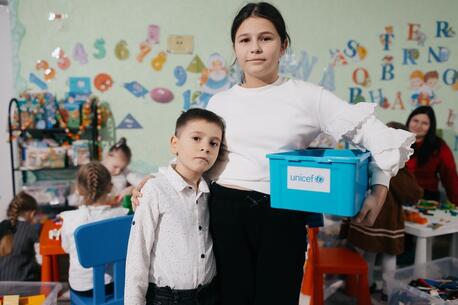UNICEF Helps Youth Build Life Skills in Jordan
UNICEF-supported Makani centers provide an array of classes and services to prepare young people for a successful future.
On a recent visit to Jordan, Andrew Maguire, UNICEF USA Deputy Director, Global Programs, witnessed firsthand the impact of UNICEF's program work to improve the lives and futures of children and young people. Here is his report:
In my work, I spend lots of time hearing experts talk the talk. Every time I hear a UNICEF colleague speak, I'm always struck by the depth of knowledge and the intentional approach the organization takes. That was certainly on display at a recent convening in Amman, Jordan. Colleagues from across Eastern and South Africa and the Middle East and North Africa came together to share successes, challenges and lessons learned implementing programs on life skills.
Life skills, also known as transferable skills or 21st-century skills, play a key role in reinforcing literacy and numeracy and unlocking personal and professional opportunities. UNICEF country office teams shared their experiences teaching skills like creativity and problem-solving, negotiation, resilience and respect for diversity. They dove into the challenges of measuring life skills development. They discussed strategies for integrating life skills into formal classroom curricula and ways of delivering lessons through informal education spaces.
Life skills training unlocks potential and helps kids reach for their dreams
While learning by listening is great, experiencing is even better. If I had only participated in this convening, I would have walked away confident that UNICEF was an essential leader in promoting life skills for young people globally.
But my time in Jordan didn't stop there. I had the chance to see some of UNICEF's programs in action across Jordan and experience firsthand the immediate impacts UNICEF has on children. My site visits demonstrated the power of translating the conversations in conference rooms to daily lessons in classrooms, something UNICEF does every day around the globe.
UNICEF-supported Makani centers are a resource and a refuge
One great example of UNICEF's life skills work in action is the Makani centers. Makani ("my space" in Arabic) centers serve both refugee and host community children with a collection of informal education offerings. The centers and their curriculum can be adapted to different age groups, physical settings, available resources and the demographics of those attending.
I had the privilege of visiting three Makani centers, one in the urban setting of East Amman, one in Azraq refugee camp and one in an informal tented settlement (ITS) where semi-nomadic families live.
The Makanis in Amman and Azraq are quite large, with multiple rooms featuring bright, colorful murals. Each room is devoted to a different subject — music, art, computer lab, tutoring in key academic subjects — taught by an enthusiastic, engaging teacher. Both facilities have outdoor spaces where kids have the room to be kids and play.
A dedicated space for children and youth growing up in informal tented settlements
In contrast, the Makani we visited in the ITS was much humbler. ITS residents move frequently to pursue various forms of agricultural work, so UNICEF and its implementing partner invested in single-room trailers that serve as flexible learning spaces. Now in over 50 ITSs across Jordan, these Makani trailers offer a safe and comfortable learning center for children living in the settlements.
Though the resources and staff available in Makanis vary, they share a common thread: Children in each are actively engaged in their learning. The children have somewhere safe to go when not in school — children are only able to attend school for half days in Jordan, due to double-shift school scheduling. Makanis have caring teachers and facilitators trained to identify children who might be facing particular challenges and help connect them with additional services.
An estimated 21 percent of Jordan's 15- to 19-year-olds are out of school and unemployed
I witnessed the power of life skills teaching in the youth engagement centers I visited in a government-run youth center in Amman and in Azraq camp. In both, adolescents were laser-focused on developing skills that could improve their future prospects. Many of the young people I spoke with dream of pursuing higher education and finding a stable job that can help them and their families. They face daunting odds, unfortunately: in Jordan, an estimated 21 percent of adolescents between the ages of 15 and 19 are neither in school, employment or training programs. That rate is even higher for young adults.
This reality motivates each of them to gain both technical skills — digital literacy, entrepreneurship and vocational skills — and life skills to help them thrive in any future workplace or classroom. UNICEF works with the Government of Jordan to weave together technical and transferrable skills development programs, leveraging available resources including cutting-edge maker spaces to promote young people's active engagement and creative thinking. UNICEF's work in these centers in a testament to why life skills development is critical to ensuring every young person meets their full potential.
One teenager I spoke with explained why she remained motivated to keep studying and learning. "Today's readers are tomorrow's builders," she said. I'm confident after meeting dynamic young leaders from across Jordan that we're in good hands with tomorrow's builders. I'm glad UNICEF can play a small but important part in making sure they get that opportunity.
UNICEF programs help children and young people around the world reach their full potential. Your contribution can make a difference. Please donate.


